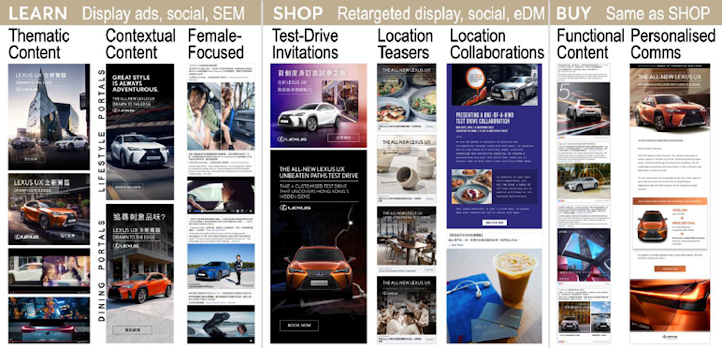3 Lessons from Lexus's Successful Story Becoming No.3 in Hong Kong for the First Time [Marketing Case Study #1]
In an era of too many products and services everywhere, quite a lot of marketers face
- a shrinking market
- fierce competition
- slow sales growth
And feel so hard to get away from such difficulties.
It was the case for Lexus, a luxury car brand owned by Toyota, in Hong Kong until 2018. With the market decline by 16% vs. 2015, Lexus struggled to win over Mercedes-Benz, BMW, and Audi (called "German 3") that dominated 82% of the share.
However, Lexus broke the deadlock and became No.3 for the first time in Hong Kong by running a marketing campaign named "Find your unbeaten path" in early 2019.
What did Lexus do? What are lessons learned from the case?
Table of Contents
- Lesson 1: Focus on a niche.
- Lesson 2: Don't sell a product.
- Lesson 3: Be data-driven thoroughly.
- Takeaways for Marketers
Lesson 1: Focus on a niche.
In the campaign, Lexus decided to target a small segment, only 3% of the Hong Kong population. It was a challenge considered that Lexus's share was at 7% in 2018.
However, for many Hong Kongers, "German 3" is a synonym for a luxury car, and Lexus was not the one. If you try to change the perception, it will need a vast amount of time and money, leading to a disaster for a weak brand.
The key to success is to explore a niche, the smallest viable market that your brand can handle and win. Usually, competitors with more market share overlook the market because it is too small for them, and in many cases, people in that segment feel uncomfortable and dissatisfied.
In this case, Lexus discovered that young and creative people saw "German 3" as too flashy and not for them since the typical marketing of a luxury car brand in Hong Kong focused on stereotype-like wealthy people in the financial business.
The No.4 brand found an opportunity here, named the segment as "Change Makers" after their desire for a new adventure and a challenge, and re-positioned itself fitting to their worldview.
With hindsight, this decision was the beginning of success.
Lesson 2: Don't sell a product.
For "Change Makers," Hong Kong at that time was not the place for a new adventure and a challenge.
Here is why. Capital inflow from China's mainland raised Hong Kong's real estate price to the world's highest level, forcing local small restaurants and shops to close. Instead, chain stores like Starbucks were everywhere, and there seemed no adventure in Hong Kong for them.
Lexus got a hint from this insight and planned a campaign called "Find your unbeaten path," which invited "Change Makers" to discover the unknown attraction of Hong Kong with Lexus's new compact SUV model, UX.
The campaign's core was a personalized test drive. Lexus helped the target audience find new places and opportunities to enjoy life in Hong Kong by introducing local restaurants and shops.
People welcomed the campaign concept since small businesses suffered an economic downturn due to the Hong Kong democracy movement. As a result, UX became the best-selling compact SUV, and Lexus captured the No.3 position for the first time in Hong Kong.
Importantly, Lexus did not blatantly sell its new product but provided a means for "Change Makers" to realize what they pursued in life. That's why Lexus got empathy and the highest market share than ever.
Lesson 3: Be data-driven thoroughly.
The other secret of campaign success is that everything was data-driven.
With a marketing budget roughly 1/2 of "German 3," mass marketing was not the No.4 brand's choice. Instead, Lexus fully utilized the power of data from identifying what marketing activities to focus on, setting KPIs, to optimizing marcomms and test drive experiences.
Highlights are again the test drive. Using data from social media, digital ads, and public APIs, Lexus realized the best test drive experience for each user, considering his or her interests and areas of activities, traffic congestion, and operating time of small local businesses at the time. This well-elaborated usage of data made the whole brand experience superb and captivated people.
These days, the term "data-driven" is somewhat a buzzword. However, this case tells us that when you integrate and use data extensively from planning to execution, from digital ads to customer services in a real place, it is super powerful and gives a weaker brand an edge to win a fierce competition.
Takeaways for Marketers
From Lexus's case, we can learn the followings;
- Explore your niche with a feeling of uncomfortableness or dissatisfaction with current status or competitors, and re-position yourself by optimizing them.
- Please don't sell your product but put it as a vehicle for delivering what a target audience pursues so that he or she can easily acknowledge what you truly offer.
- Being data-driven can be an engine for a weak brand to break the deadlock if you use them extensively and in an integrated way.
If you want to know more details of this case, check warc.com and "Lexus: Find Your Unbeaten Path," the article's source.
Thanks for reading, and bye!





Comments
Post a Comment